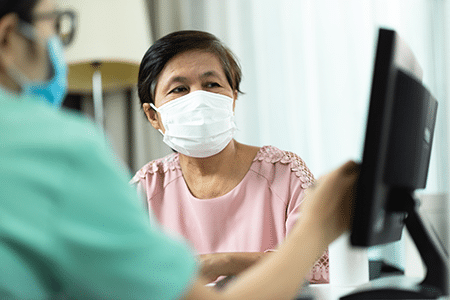Health Literacy

Most experts agree that the COVID-19 crisis will significantly alter the way health care is delivered.

Virtual appointments and telehealth are likely to replace many visits to doctors’ offices, even after the crisis has passed. Physicians can communicate with patients through email, text or phone, reducing the need for face-to-face contact. Psychiatric services can be conducted electronically. Screenings such as blood pressure, weight and blood glucose levels can be done in a patient’s homes and the results transmitted to a primary care provider. Appointments can be made and confirmed online, and follow-up instructions delivered to patients electronically or over the phone.
As the healthcare landscape changes, it is more important than ever for patients to practice health literacy in all aspects of their care. Health literacy, as defined by the U.S. Department of Health and Human Services, is “the degree to which individuals have the capacity to obtain, process and understand basic health information needed to make appropriate health decisions.”
Health literacy enables patients to take control of their health and healthcare by being informed, communicating effectively with physicians and other healthcare workers, and advocating for themselves and their loved ones concerning medical matters. Health literacy makes it possible for patients to prepare for doctor appointments by familiarizing themselves with conditions, knowing what questions and issues they want to address with the provider, and helping patients understand what the provider says and any offered instructions.

Health Literacy is Important for Individual & Community Health
A lack of health literacy can negatively affect both individuals and communities. A person lacking in health literacy may not understand why it is important to take a medication at a particular time of the day or to recognize symptoms of a serious condition, such as a stroke.
A lack of health literacy could prevent people who may have been exposed to COVID-19 from keeping distanced from others or wearing masks at the community level. Those with reduced health literacy tend to have poorer medical outcomes, which drives up costs and can put a strain on available resources.
“Low health literacy is costly for the country because when people don’t understand health information and instructions, they are more likely to have worse health outcomes and unnecessarily use emergency room services,” explained Akeia Blue, a health communications consultant with Be Health Literate, an organization that works to raise awareness about the importance of health literacy.

How to Improve Your Health Literacy
Health literacy may not come naturally to all patients, but there are steps you can take to improve the way you communicate with providers and use health-related information.
Prepare for appointments, whether virtual or in-person. Write down any questions you want to ask or concerns you have. If your appointment is virtual, have pictures ready to help your doctor see a condition such as a sore or rash. Be sure you are familiar with the technology you will be using to avoid delaying the appointment. Ensure that your insurance covers the telemedicine platform you use, or that you have another means for covering the cost of services.
Speak up if there is something you do not understand. If any health care provider offers information or advice that seems confusing, be sure to ask the provider to explain further.
Protect yourself by learning prior to an appointment what your health care provider is doing to assure compliance with guidelines issued by the Centers for Disease Control (CDC) regarding operations during the coronavirus pandemic. You have a right to know that guidelines are being followed.
Find a primary care provider you trust and can work with. If you do not have a primary care provider, ask family members and friends for recommendations, or look at a list of doctors who are within your insurer’s network. The primary care provider will serve as an entry point to your care and can guide you to specialty services if necessary. If you are referred to a specialist, consider utilizing the Nurse Navigation services at ConnectCare3, made available at no cost to you by your employer.
A Nurse Navigator will assist you with understanding your diagnosis by researching medical databases and providing resources on your diagnosis and treatment plan in language that is easy to understand. ConnectCare3’s Nurse Navigators can also provide you physician options based on your needs, diagnosis, and the physician’s area of expertise. They can also assist you in making the most of your physician appointments by providing you with tools on how to gather your medical records and preparing you a list of questions and talking points for your appointment.
Improving your health literacy can make you more confident regarding your ability to communicate effectively with healthcare providers, better understand information relayed to you, and take better control of your healthcare journey.
You can learn more about health literacy at HealthyPeople.gov, a website managed by the U.S. Department of Health and Human Services.

Download the Free Resource
Access a printer-friendly version of the resource to reference later.